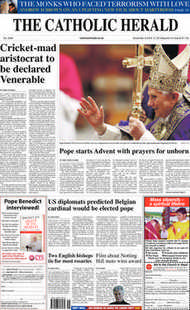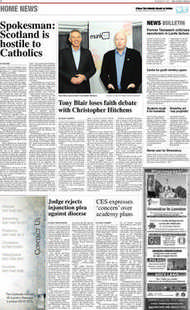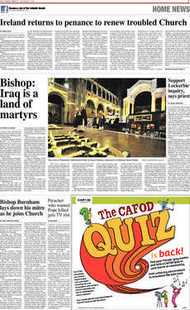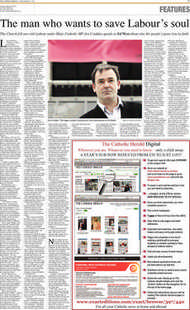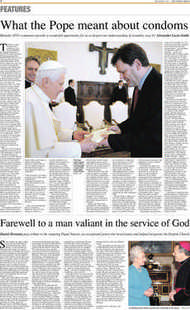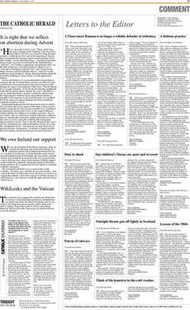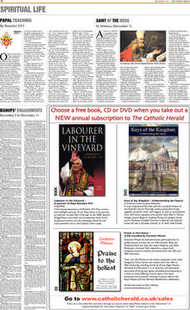Page 2, 3rd December 2010
Page 2
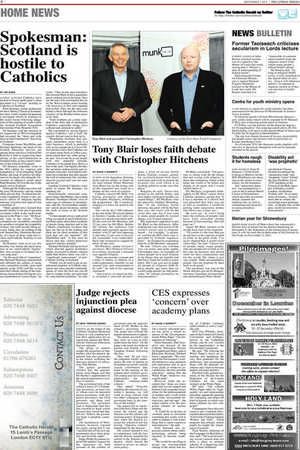
Report an error
Noticed an error on this page?If you've noticed an error in this article please click here to report it.
Tags
Share
Related articles
Christopher Hitchens To Debate Faith With Tony Blair
How Tony Blair Might Have Defeated Christopher Hitchens...
Tony Blair: Ban On Catholic Ambassador Post Was ‘stupid’
Tony Blair Has Lost His Moral Bearings
By Simon Caldwell
Church Leaders Assess Highs And Lows Of Blair's Decade In...
Tony Blair loses faith debate with Christopher Hitchens
BY DAVID V BARRETT
IN SPITE OF his legendary debating skills and his ability to think on his feet former Prime Minister Tony Blair was on the losing side of the argument last week in a debate on the value of religion.
Catholic convert Mr Blair was facing journalist and atheist Christopher Hitchens, debating the proposition: “Be it resolved, religion is a force for good in the world.” The vote by the 2,700 audience at the end of the 90-minute debate in Toronto, Canada, last week was a clear two-thirds/one-third split: 68 per cent for Mr Hitchens and 32 per cent for Mr Blair. Before the debate the audience had already been strongly against the motion, with 57 per cent opposing it and only 22 per cent in favour; the remainder were undecided: Each side increased its support by about 10 per cent.
Mr Hitchens, author of God is not Great: How Religion Poisons Everything, presented a forceful case against religion.
“Once you assume a creator and a plan, it makes us objects in a cruel experiment, whereby we are created sick, and commanded to be well,” he said in his opening statement.
“And over us, to supervise this, is installed a celestial dictator ship, a kind of divine North Korea. Greedy, exigent, greedy for uncritical praise from dawn until dusk and swift to punish the original sins with which it so tenderly gifted us in the very first place.” Religion, he said, “forces nice people to do unkind things, and also makes intelligent people say stupid things”. Mr Hitchens cited the physicist Stephen Weinberg, that “in the ordinary moral universe, the good will do the best they can, the worst will do the worst they can, but if you want to make good people do wicked things, you’ll need religion”.
His arguments appeared to put Mr Blair on the defensive. After making the case that much of the world’s social care is religionbased – for example, “a quarter of worldwide HIV/Aids care is provided by Catholic organisations” – he finished by responding directly to Mr Hitchens’ argument.
He said: “I know very well that you can point, and quite rightly Christopher does, to examples of where people have used religion to do things that are terrible and that have made the world a worse place. But I ask you not to judge all people of religious faith by those people, any more than we would judge politics by bad politicians. Or indeed journalists by bad journalists.” Mr Blair concluded: “The question is, along with all the things that are wrong with religion, is there also something within it that helps the world to be better and people to do good, and I would submit there is.” Mr Hitchens responded forthrightly to Mr Blair’s point about Catholic charities, saying that “if I was a member of a church that had preached that Aids was not as bad as condoms, I would be putting some conscience money into Africa too, I must say”.
He went on: “It won’t bring back the millions of people who have died wretched deaths because of that teaching, that still goes on.” Again Mr Blair seemed to be on the back foot in his response.
“Of course it’s the case that you do not have to be a person of faith in order to do good work, I’ve never claimed that, I would never claim that,” he said. “I know lots of people, many, many people, who are people not of faith at all, but who do fantastic and decent work for their communities and for the world. My claim is just very simple. There are nonetheless people who are inspired by their faith to do good.” The encounter was one of the Munk debates put on by Hungarian-born Canadian businessman and philanthropist Peter Munk
blog comments powered by Disqus


